De Amerikaanse dichter en letterkundige Edward Hirsch werd geboren op 20 januari 1950 in Chicago. Zie ook alle tags voor Edward Hirsch op dit blog.
Fast Break
In Memory of Dennis Turner, 1946-1984
A hook shot kisses the rim and
hangs there, helplessly, but doesn’t drop,
and for once our gangly starting center
boxes out his man and times his jump
perfectly, gathering the orange leather
from the air like a cherished possession
and spinning around to throw a strike
to the outlet who is already shoveling
an underhand pass toward the other guard
scissoring past a flat-footed defender
who looks stunned and nailed to the floor
in the wrong direction, trying to catch sight
of a high, gliding dribble and a man
letting the play develop in front of him
in slow motion, almost exactly
like a coach’s drawing on the blackboard,
both forwards racing down the court
the way that forwards should, fanning out
and filling the lanes in tandem, moving
together as brothers passing the ball
between them without a dribble, without
a single bounce hitting the hardwood
until the guard finally lunges out
and commits to the wrong man
while the power-forward explodes past them
in a fury, taking the ball into the air
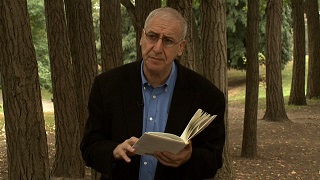
Edward Hirsch (Chicago, 20 januari 1950)
De Nederlandsche schrijver en journalist Stefan Popa werd op 20 januari 1989 geboren in Vleuten. Zie ook alle tags voor Stefan Popa op dit blog.
Uit: A27
“Henri heeft niets tegen het rood van verkeerslichten. Integendeel zelfs. Het geeft anderen de kans om zijn auto te bewonderen. Ook vandaag prijst hij het signaal dat niet alleen hem maant tot stoppen, maar ook de vrouw op de rijstrook naast hem. Ze rijdt in een lichtblauwe hatchback, Frans fabricaat. Auto en vrouw zijn even sierlijk afgewerkt. Smaakvol, chic. Een jonge twintiger en een oldtimer, schat Henri. Hij lacht naar haar, ze ziet het niet. Ze kamt haar haren met haar vingers, haar lange nagels schrapen over haar hoofdhuid, terwijl Henri wenst dat het zijn huid is waar haar nagels wegtrekkende witte lijnen in kerven.
Mijn begeerte is onstilbaar, denkt hij. Weet hij. Hij is omringd door knoppen en schakelaars waarvan alleen zijn zoon begrijpt waar ze voor dienen. Zelf weet hij waar de belangrijkste knop zit: aan zijn linkerzijde, aan het uiteinde van zijn armsteun.
Het raam glijdt open. De prille winter komt binnen.
– Wensen zijn er om te verwezenlijken, zegt hij tegen zichzelf.
Henri test zijn meest nonchalante blik in de achteruitkijkspiegel en zet zijn wenkbrauwen vast. Van de passagiersstoel grist hij de blaaspijp die hij in het weekend zijn zoon heeft afgenomen. Hij drukt de mond van de gele pvc-pijp tegen de zijne en pakt een besje uit de broodtrommel die hij ook maar meteen in beslag had genomen. Munitie. Laden en richten. Henri’s wangen bollen op voordat hij met een puf de bes uiteen laat spatten tegen de ruit van de Franse hatchback.”
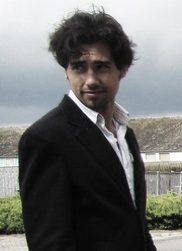
Stefan Popa (Vleuten, 20 januari 1989)
De Turkse schrijver Nazim Hikmet werd op 20 januari 1902 geboren in Thessaloniki. Zie ook alle tags voor Nazim Hikmet op dit blog.
Hymn To Life
The hair falling on your forehead
suddenly lifted.
Suddenly something stirred on the ground.
The trees are whispering
in the dark.
Your bare arms will be cold.
Far off
where we can’t see,
the moon must be rising.
It hasn’t reached us yet,
slipping through the leaves
to light up your shoulder.
But I know
a wind comes up with the moon.
The trees are whispering.
Your bare arms will be cold.
From above,
from the branches lost in the dark,
something dropped at your feet.
You moved closer to me.
Under my hand your bare flesh is like the fuzzy skin of a fruit.
Neither a song of the heart nor “common sense”–
before the trees, birds, and insects,
my hand on my wife’s flesh
is thinking.
Tonight my hand
can’t read or write.
Neither loving nor unloving…
It’s the tongue of a leopard at a spring,
a grape leaf,
a wolf’s paw.
To move, breathe, eat, drink.
My hand is like a seed
splitting open underground.
Neither a song of the heart nor “common sense,”
neither loving nor unloving.
My hand thinking on my wife’s flesh
is the hand of the first man.
Like a root that finds water underground,
it says to me:
“To eat, drink, cold, hot, struggle, smell, color–
not to live in order to die
but to die to live…”
And now
as red female hair blows across my face,
as something stirs on the ground,
as the trees whisper in the dark,
and as the moon rises far off
where we can’t see,
my hand on my wife’s flesh
before the trees, birds, and insects,
I want the right of life,
of the leopard at the spring, of the seed splitting open–
I want the right of the first man.
Vertaald door Randy Blasing Mutlu Konuk
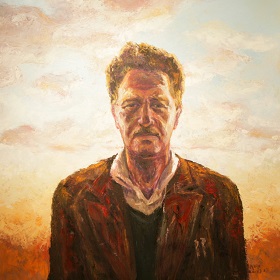
Nazim Hikmet (20 januari 1902 – 3 juni 1963)
Portret door İbrahim Balaban, jaren 1940
De Duitse (Luxemburgse) schrijver Guy Helminger werd geboren op 20 januari 1963 in Esch-sur-Alzette. Zie ook alle tags voor Guy Helminger op dit blog.
Uit: Die Bahnfahrt
“Da!” sagte die, die ihren Mund verzogen hatte und schüttelte den Kopf. Aber niemand wusste, ob sie die Regenwolken meinte oder den Jungen, der sich nun nicht mehr festhielt, sondern breitbeinig in der Bahn direkt vor ihnen stand. Er sah noch immer in ihre Mitte. Wen schaut er an, dachten sie und spürten, dass der Luftzug, der schwächer wurde, ihnen eine Gänsehaut um die nackten Arme legte. Zwei von ihnen drehten dem Jungen demonstrativ den Rücken zu, stellten sich an die Tür.
Es herrschte massive Ruhe, doch der Junge behielt seinen Blick auf den Schülerinnen und sagte wiederum:,, Ich bin berühmt”.
Das Mädchen zerrte an einer Metalstange um etwas an einem Platz aufzuheben, eine Zeitung.
Fassungslos sahen sich beide an und Verstanden das Problem des Jungen, wollte er aber etwas von ihnen oder nicht.
,, Wenn du ein Problem mit uns hast, steig aus…”, des Mädchens Worte klangen bedrohend. Die Wolken verzogen sich, und es fing an zu regnen. Dunkle blaue Tränen vielen vom Himmel:,, Hey, der Himmel…..
er weint…”, der eisige Wind wurde nun noch einmals stärker.
Die Glasfenster schienen zu zersplittern, viele kleine Tropfen stürzte auf die durchsichtige Scheibe. Die Mädchen wurden unruhig….., es war noch ein langer Weg bis nach Hause und der Junge war immernoch nicht ausgestiegen. Er sah mit hängendem Kopf nach unten und rührte sich nicht, man sah sein Gesicht nicht, seine Hand streckte er nach oben um sich festzuhalten. Eine schwarze Jacke bedeckte seinen Körper und eine Person nach der anderen stieg aus.”
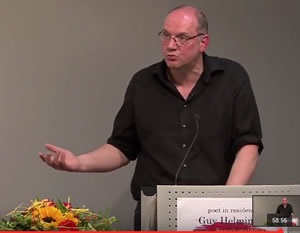
Guy Helminger (Esch-sur-Alzette, 20 januari 1963)
De Israëlische schrijfster, journaliste en literatuurwetenschapster Batya Gur werd geboren op 20 januari 1947 in Tel Aviv. Zie ook alle tags voor Batya Gur op dit blog.
Uit: Murder Duet: A Musical Case (Vertaald door Dalya Bilu)
“Outside the ground-floor apartment Michael had been living in for some years now, all was quiet, too. You had to go down a few steps to enter it, and to stand in the living room and look through the big glass doors leading to the narrow balcony in order to discover the hills opposite and the religious women’s teachers college curving like a white snake in order to realize that it wasn’t a basement apartment but had been built on the steep slope of a hill.
The voices of the apartment building’s children who had been called inside died down. Even the cello up above, which for several days now he had been hearing playing scales at length and then in a Bach suite, was silent. Only a few cars drove past on the winding street at which he now looked, as he unthinkingly pressed the CD player’s button. His hands had preceded his conscious mind and doubts. His act caused the loud unison opening of Brahms’s First Symphony to fill the room. In a moment what now appeared to be the illusion of peaceful harmony which he imagined he had succeeded in achieving within himself after long days of restless disorientation had disappeared.
For with the very first tense orchestral sound, a great new disquiet began to awaken and well up inside him. Streams of small anxieties, forgotten distresses, made their way from his stomach to his throat. He looked up at the damp stains on the kitchen ceiling. They were growing bigger from day to day, and changing from a dirty white to a gray-black wetness. From this sight, which pressed down on him like a lump of lead, it was a short way to thought and words. For these stains required an urgent appeal to his upstairs neighbors, a talk with the tall, bleary-eyed, carelessly dressed woman.”
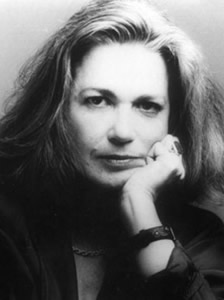
Batya Gur (20 januari 1947 – 19 mei 2005)
De Indiaase schrijfster Qurratulain Hyder werd geboren op 20 januari 1927 in Aligarh, Uttar Pradesh. Zie ook alle tags voor Qurratulain Hyder op dit blog.
Uit: River of Fire
“Kadamba flowers glimmered like little red lamps set amidst the heart-shaped kadamba leaves. Krishna Banmali, god of the woods, used to play his flute under the kadamba trees. The easterly wind seemed to waft the notes of his flute across the eons, shaking the branches so that drops of rain fell like a shower of tiny diamonds. A peacock danced under a flaming dhak. Magnolias were in full bloom. A lone ferryman sang somewhere in the watery expanse. The two fair women glowed like pale moons in the river-mist. The scene was like something out of the sylvan idyll of the ‘Golden Age’ that Gautam had heard about. Reluctantly he came out of hiding and dived into the swiftly flowing water. The cool restful waves of the Saryu filled him with a deep contentment. He began swimming across to the other bank. The three young women heard the splash and watched a gorgeous young man appear out of the water like a silver figure emerging from the waves of a dream. He disappeared again in the mist. “Some poor miserable student roughing it out,” fish-eyed Kumari Champak observed sympathetically. “How did you guess?” asked the doe-eyed one. “He did not hire the ferry.” “Why aren’t they allowed to use boats even in bad weather?” asked Jamuna, the maid. “To make them hardy, so that they can sit tirelessly under the bargad trees and propound more philosophy,” Champak replied sourly, stepping down into the river. The doe-eyed one noted the bitterness in her companion’s voice and sighed. The sight of the white-robed scholar had upset her, too. Her own brother, the crown prince, was also a student. He had not come back from Taxila. Eight long years and he had still not returned home. They waited for him patiently, praying hard for his safe return. Meanwhile poor Champak, the chief minister’s daughter, had no choice but to discuss matters of intellect with visiting Chinese scholars.”
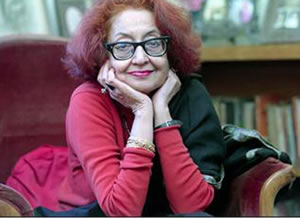
Qurratulain Hyder (20 januari 1927 – 21 augustus 2007)
De Amerikaanse schrijver Robert Olen Butler Jr. Werd geboren op 20 januari 1945 in Granite City, Illinois. Zie ook alle tags voor Robert Olen Butler Jr. op dit blog.
Uit: Fairy Tale
“And the duck is not crushed on the ground. He is just lying down and he can get up when he wants to. I love that man for telling the Vietnam people this true thing. So I come to America and when I come here I do not know I will be in more bars. I come thinking I still love that man and I will be a housewife with a toaster machine and a vacuum cleaner. Then when I think I don’t love him anymore I try one last time and I ask him in the dark night to tell me about the sunburnt duck, what is that story. He thinks I am one crazy Vietnam girl and he says things that can burn Miss Noi more than the sun.
So boom, I am gone from that man. There is no more South Vietnam and he gives me all the right papers so I can be American and he can look like a good man. This is all happening in Atlanta. Then I hear about New Orleans. I am a Catholic girl and I am a bargirl, and this city sounds for me like I can be both those things. I am 25 years old and my titties are small, especially in America, but I am still number one girl. I can shake it baby, and soon I am a dancer in a bar on Bourbon Street and everybody likes me to stay a Vietnam girl. Maybe some men have nice memories of Vietnam girls.
I have nice memories. In Saigon I work in a bar they call Blossoms. I am one blossom. Around the corner I have a little apartment. You have to walk into the alley and then you go up the stairs three floors and I have a place there where all the shouting and the crying and sometimes the gunfire in the street sounds very far away. I do not mix with the other girls. They do bad things. Take drugs, steal from the men. One girl lives next to me in Saigon and she does bad things. Soon people begin to come in a black car. She goes. She likes that, but I do not talk to her.”
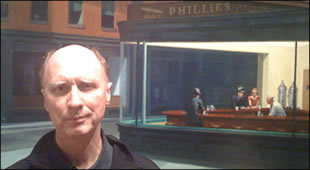
Robert Olen Butler Jr. (Granite City, 20 januari 1945)
De Duitse schrijver en journalist Axel Hacke werd geboren op 20 januari 1956 in Braunschweig. Zie ook alle tags voor Axel Hacke op dit blog.
Uit: Oberst von Huhn bittet zu Tisch
„Jeder kennt das: Man sitzt in einem Restaurant im Ausland, möchte etwas essen, nimmt die Speisekarte zur Hand. Links sieht man die Speisen in der Landessprache verzeichnet, die versteht man oft nicht, rechts in einer Sprache, bei deren Anblick man sich sagt: Das kommt mir irgendwie bekannt vor. Sieht aus wie die Sprache, die ich selbst spreche. ist aber viel schöner. Kommt einem vor wie Deutsch, ist aber kein Deutsch. Es ist etwas Drittes, ganz Neues.
Beginnen wir mit einem Beispiel. Einer meiner Leser war in Griechenland. Von dort brad1te er eine Speisekarte mit. (So etwas tunmeine Leser seit Vielen Jahren für mich: Sie stehlen unter erheblichen persönlichen Risiken überall auf der Welt Speisekarten und schmuggeln diese außer Landes. Wenn das nicht möglich ist, Fotografieren sie die Menülisten. Oder kopieren sie. Oder lernen die Texte auswendig und schreiben sie auf – und füttern mich damit. nur um mir eine Freude zu machen. Ist das nicht reizend? Ich danke allen herzlich.)
Man sah auf dieser Karte links alles auf Griechisch, rechts erblickte der Leser jenes erwähnte seltsam-poetisch verfremdete Auslands-deutsch. In der Mitte aber waren alle Gerichte auf Englisch verzeichnet, darunter ein kleines Essen, das man vielleicht nebenbei, zum Ouzo, Retsina, vielleicht auch zu einem Bier hätte nehmen können.“
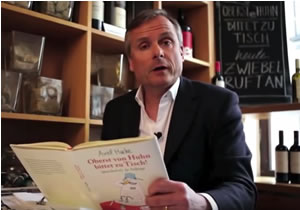
Axel Hacke (Braunschweig, 20 januari 1956)
Zie voor nog meer schrijvers van de 20e januari ook mijn drie blogs van 20 januari 2013.
